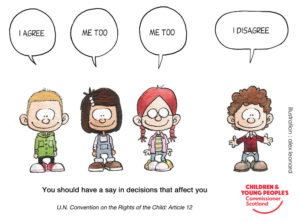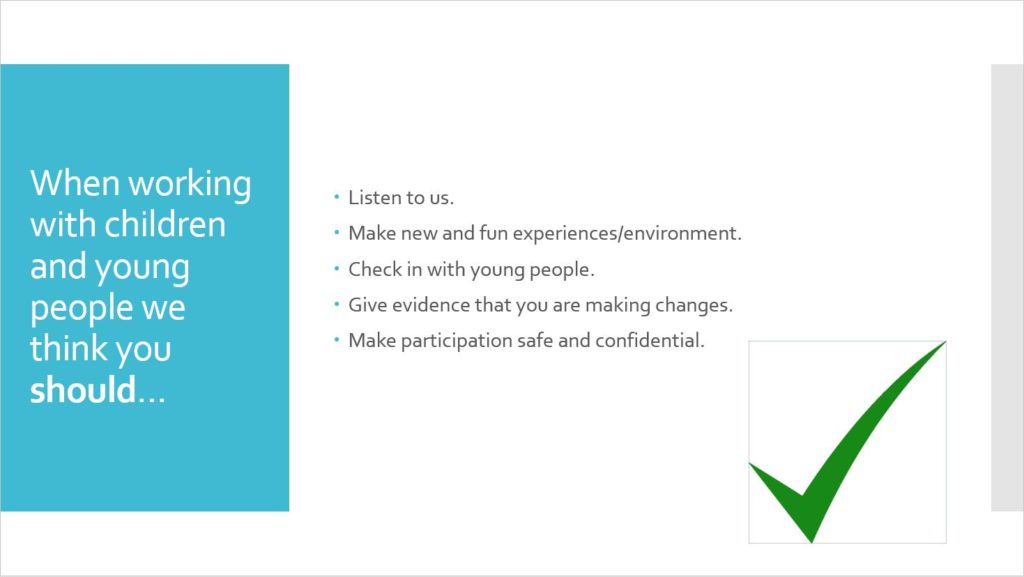Learning how to make children safer – by respecting what children tell us
Children tell us that some of the systems that are supposed to keep them safe and well actually harm them. But our systems are not always good at hearing what children can tell us about how to keep them safer. One particular area of concern is child contact – the legal systems that decide if, when and how a child has contact with a parent they are not usually living with, including where that parent has been abusive.
Children have described their experiences of child contact systems as making them feel unsafe, unwell, scared and powerless (Houghton and MacDonald, 2018).
Imagine having to stay with someone who scares you so much your tummy hurts. The whole time you are wishing you were home where you feel safe.
A young person, Everyday Heroes (Houghton and MacDonald, 2018)
Children may experience neglect, physical and emotional abuse during court ordered contact visits (Mackay, 2018).
I don’t want to go to dad because he shouts and swears. He grabs my collar and he hurts me. […] He makes us clean his house. When he drinks he falls asleep on the couch.
A young person, Mackay 2018
Too often our systems over-rule what children tell us. Mackay (2018) found that courts may listen to children if they want contact – but overwhelmingly, if a child had concerns, these were ignored. Our systems are harming children because we are breaching children’s rights to give their opinion freely and to have that opinion taken into account (United Nations Convention on the Rights of the Child, Article 12).

UNCRC, Article 12. Your Rights in Pictures. Children and Young People’s Commissioner Scotland, Illustration by Alex Leonard.
A new European funded project is testing out mechanisms to be better at upholding children’s rights in child contact systems. Five countries are working together on Improving Justice in Child Contact for children affected by domestic violence. The project has two main goals:
- to find out what we can do better to listen seriously to children; and
- to work together on what we need to change in our child contact systems to make children and women safer.
The partner organisations met together face-to-face for the first time in February at our kick-off meeting. Together we looked at two key models which can help children be listened to in child contact decisions:
- Power Up/Power Down, a way to empower children affected by domestic violence to safely and meaningfully express their views about child contact; and
- a Domestic Abuse Children’s Rights Officer, providing independent, specialist advocacy for children to be listened to and informed throughout the legal process.
We looked at the Super Listener designed by children and young people to help us all understand what children want from grown-ups working with them. We heard directly from young people who had experienced domestic violence about how they wanted to work with us, and their priorities for the project. The young people started by leading us in an activity so that we could all get to know each other better – and feel comfortable working with each other.

What our young experts think adults should do. IJCC Young Expert Group.
We worked through how our current systems are working in each of the countries – what is helping children and women to be safe, and what is getting in the way of children and women being safe. We tested out each other’s ideas – asking questions, providing support – and went away with a plan to try and work with all the organisations in our countries that are part of this system, to agree together what changes we can make so that children are listened to. At the end of the meeting partners said how much they’d appreciated learning from each other and the young experts – although we wished we could have had more time together.
We look forward to telling you more about what our project finds out over the next 18 months.
References:
Houghton, C. and MacDonald, R. (2018) Everyday Heroes Justice Report. https://everydayheroes.sps.ed.ac.uk/wp-content/uploads/2018/11/everyday-heroes-briefing2-Justice.pdf
Mackay, K. (2018) The approach in Scotland to child contact disputes involving allegations of domestic abuse, Journal of Social Welfare and Family Law, 40:4, 477-495.
Interested in reading more? See a 2018 blog by the University of Edinburgh project lead, Professor Kay Tisdall, on why we find it challenging to involve children and young people in decisions that affect them.




Comments are closed
Comments to this thread have been closed by the post author or by an administrator.